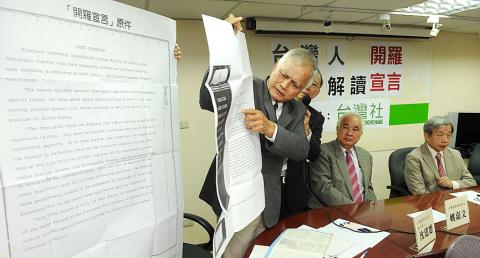President Ma Ying-jeou’s (馬英九) interpretation of the Cairo Declaration, issued on Dec. 1, 1943, as the legal basis of Taiwan’s “return” to the Republic of China (ROC) after World War II was not only incorrect, but also dangerous because his rhetoric was exactly the same as that of Beijing, pro-independence advocates said yesterday.
“[Ma’s interpretation] fits right in with the ‘one China’ framework, which would be interpreted by the international community as saying Taiwan is part of China because hardly anyone would recognize the China in ‘one China’ framework as referring to the ROC,” Taiwan Society President Chang Yen-hsien (張炎憲), a former president of the Academia Historica, told a press conference.
The Treaty of San Francisco, signed on Sept. 8, 1951, should have been the only legal document to determine Taiwan’s status, not the Cairo Declaration in 1943, nor the Potsdam Declaration of 1945, Chang and other experts said at the press conference, held almost at the same time as a commemoration ceremony for the 70th anniversary of the First Cairo Conference, organized by the Presidential Office.

Photo: Wang Min-wei, Taipei Times
Since Ma took the same position on the declaration as Beijing, which cited it as the legal basis for Taiwan’s return to China, he is risking two important issues, said Vincent Chen (陳文賢), a professor at National Chengchi University’s Graduate Institute of Taiwan History.
“With Ma taking the same position, Beijing could bolster its argument about Chinese sovereignty over the Diaoyutai Islands (釣魚台), which it claimed had been returned to China along with Taiwan and Penghu in the declaration,” Chen said.
“[Ma’s] adherence to the ‘one-China’ framework could, in the long run, create a false perception among the international community that Taipei and Beijing would follow the post-World War II unification models of Vietnam and Germany and unify in the future,” he said.
While the declaration, which was released in the form of a press communique after the meeting of Chiang Kai-shek (蔣介石), then-US president Franklin Roosevelt and then-British prime minister Winston Churchill in Cairo, said that “all the territories Japan has stolen from the Chinese, such as Manchuria, Formosa, and the Pescadores, shall be restored to the Republic of China,” the ROC referred to the country which was in the state of war with Japan, not the country which is now in Taiwan with different people and territory from “the old ROC,” Taiwan Nation Alliance convener Yao Chia-wen (姚嘉文) said.
The context of the Cairo Declaration would be better interpreted by examining the post-World War II developments and comments made by leaders of involved countries, the advocates said.
Yao said that Churchill told the British parliament on Feb. 1, 1955, that he would not accept the view that the declaration could be used as a binding document to claim that China has sovereignty over Taiwan, adding that Japan’s prime minister and foreign minister had also made it clear that Japan renounced its claim over Taiwan and did not hand it to anyone.
Since the declaration was not a treaty but a communique, it did not transfer Taiwan’s sovereignty, Provisional Government of Formosa executive secretary Sim Kian-tek (沈建德) said.
Moreover, the communique was not signed by any leaders because Roosevelt and Churchill had different views about how to handle Taiwan’s future, Sim said.

Alain Robert, known as the "French Spider-Man," praised Alex Honnold as exceptionally well-prepared after the US climber completed a free solo ascent of Taipei 101 yesterday. Robert said Honnold's ascent of the 508m-tall skyscraper in just more than one-and-a-half hours without using safety ropes or equipment was a remarkable achievement. "This is my life," he said in an interview conducted in French, adding that he liked the feeling of being "on the edge of danger." The 63-year-old Frenchman climbed Taipei 101 using ropes in December 2004, taking about four hours to reach the top. On a one-to-10 scale of difficulty, Robert said Taipei 101

Nipah virus infection is to be officially listed as a category 5 notifiable infectious disease in Taiwan in March, while clinical treatment guidelines are being formulated, the Centers for Disease Control (CDC) said yesterday. With Nipah infections being reported in other countries and considering its relatively high fatality rate, the centers on Jan. 16 announced that it would be listed as a notifiable infectious disease to bolster the nation’s systematic early warning system and increase public awareness, the CDC said. Bangladesh reported four fatal cases last year in separate districts, with three linked to raw date palm sap consumption, CDC Epidemic Intelligence

Taiwanese and US defense groups are collaborating to introduce deployable, semi-autonomous manufacturing systems for drones and components in a boost to the nation’s supply chain resilience. Taiwan’s G-Tech Optroelectronics Corp subsidiary GTOC and the US’ Aerkomm Inc on Friday announced an agreement with fellow US-based Firestorm Lab to adopt the latter’s xCell, a technology featuring 3D printers fitted in 6.1m container units. The systems enable aerial platforms and parts to be produced in high volumes from dispersed nodes capable of rapid redeployment, to minimize the risk of enemy strikes and to meet field requirements, they said. Firestorm chief technology officer Ian Muceus said

MORE FALL: An investigation into one of Xi’s key cronies, part of a broader ‘anti-corruption’ drive, indicates that he might have a deep distrust in the military, an expert said China’s latest military purge underscores systemic risks in its shift from collective leadership to sole rule under Chinese President Xi Jinping (習近平), and could disrupt its chain of command and military capabilities, a national security official said yesterday. If decisionmaking within the Chinese Communist Party has become “irrational” under one-man rule, the Taiwan Strait and the regional situation must be approached with extreme caution, given unforeseen risks, they added. The anonymous official made the remarks as China’s Central Military Commission Vice Chairman Zhang Youxia (張又俠) and Joint Staff Department Chief of Staff Liu Zhenli (劉振立) were reportedly being investigated for suspected “serious